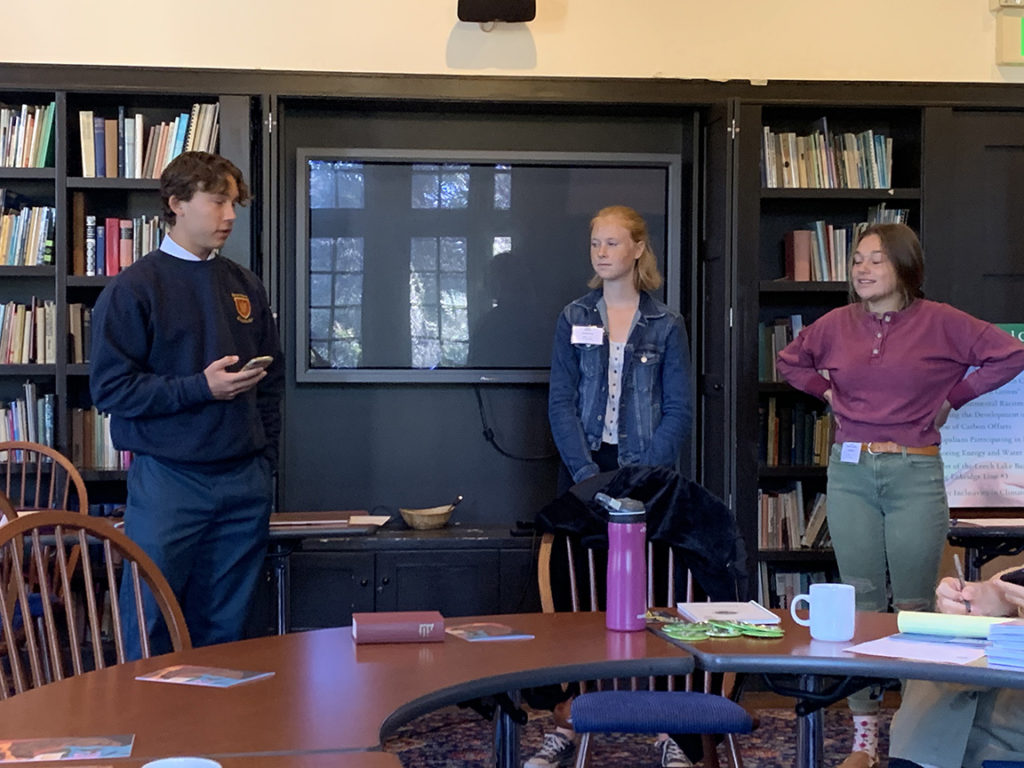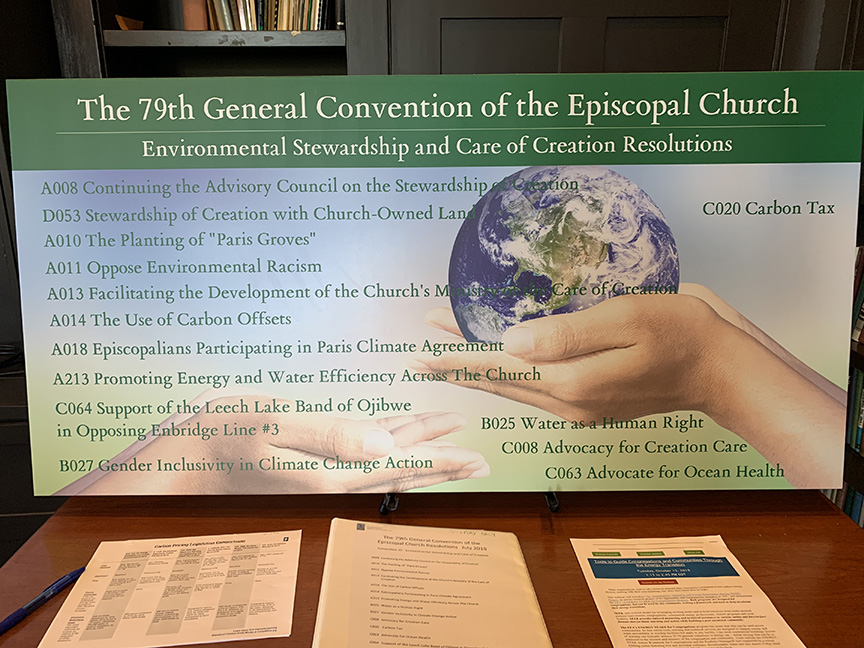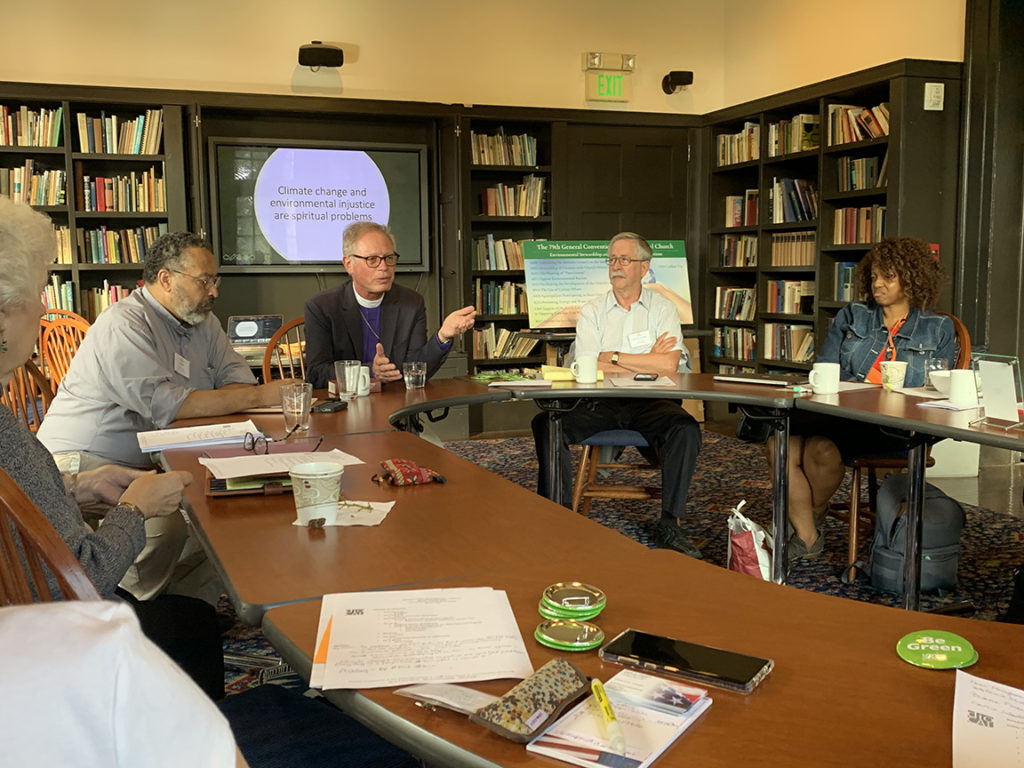
Julian Kimura, Greta Griffen and Caysee McCormich, leaders of the Episcopal Eco League at St. Andrew’s, Ojai, speak at the Climate Justice summit. Photo: Greg Kimura
MEMBERS OF ST. ANDREW’S, OJAI, were among representatives from the six dioceses of California who learned about an all-church effort to combat climate change at a Climate Justice and Episcopal Public Policy Network of California summit Sept. 27 – 28 at Church Divinity School of the Pacific in Berkeley.
The meeting was hosted by the Diocese of California and included a presentation on effects of climate change on indigenous groups by Bishop of California Marc Andrus. The Rev. Canon Melanie Mullen, director of Reconciliation, Justice, and Creation Care for The Episcopal Church, led a discussion about the wider church’s initiatives to combat global warming.
A large portion of the Saturday session was devoted to the online carbon footprint reduction application “Sustaining Earth: Our Island Home.” The app was rolled out over the past few months nationally after being piloted by four dioceses, including the Diocese of California, where it was developed.
The app, which provides specific, manageable ways for individuals and congregations to combat climate change, will be the center of the Diocese of Los Angeles’ Lenten observance in 2020, according to Bishop John Harvey Taylor.

A list of Episcopal Church resolutions on climate change and ecology was displayed at the climate summit Sept. 27 -28. Photo: Greg Kimura
The youth environmental group of St. Andrew’s, Ojai, dubbed the Episcopal Eco League (EEL), has conducted a pilot program using the app. Led by Caysee McCormick, 20; Julian Kimura 17; and Greta Griffen, 16, EEL sets up a table at Sunday post-service coffee hours and helps St. Andrew’s households enroll in “Sustaining Earth: Our Island Home.” Weekly, they monitor progress in reducing household carbon usage, providing encouragement as well as help.
“Environment is a passion of young folks, especially witnessing the activism at the recent United Nations meeting,” said St. Andrew’s rector, the Rev. Greg Kimura. “The youth are also digitally savvy, and they were able to use that expertise to guide some of the less tech-savvy of us in church through the app.”
Through the app, enrollees answer questions online regarding energy usage, then are given a menu of practical options for reducing their impact on the environment. Suggestions range from cutting down on clothes dryer usage to installing solar panels. Users at St. Andrew’s also are provided with a starter kit by EEL that includes clothespins and LED light bulbs.
“We have started social media so the larger community knows about the EEL so we can get not just our church but the whole community involved,” said Griffen. This has led to partnerships and collaborative opportunities for beach and trail clean-ups. Griffen also marched and spoke recently at the local “Fridays for Future” environmental event.
Outreach has also meant helping those in the congregation who may not have the physical ability to follow some of the the app’s recommendations,
“We offer after church even to go to people’s homes and install LED light bulbs, for example,” said McCormick.
“What we have tried to do in our community is use the tools the Episcopal diocese [of California] has given us with this website, generally promoting mindfulness among people in our church concerning the environment through smaller changes,” said Julian Kimura.
“We know it makes a difference.”
Churches and households can join “Sustaining Earth: Our Island Home” by clicking here and finding their diocese and church on the “Get Started” drop-down menu. More about the Diocese of Los Angeles’ Lenten participation in the program will be announced at Diocesan Convention and in the Episcopal News Update and other publications.

Bishop of California Marc Andrus addresses the climate summit at CDSP in Berkeley. Photo: Greg Kimura
